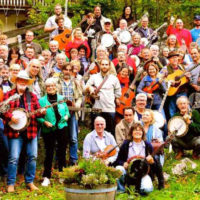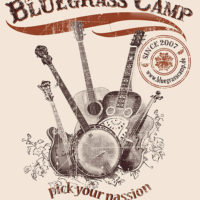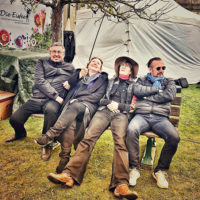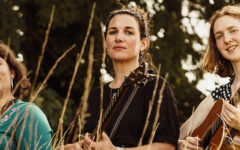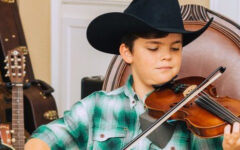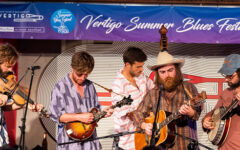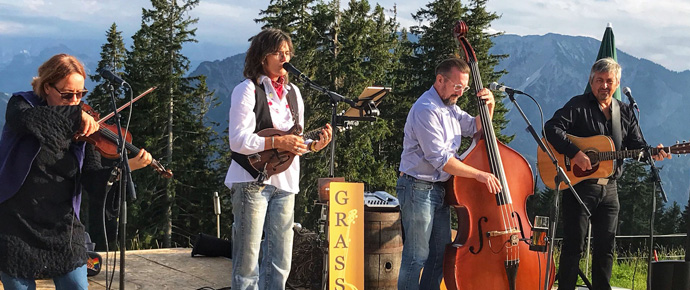
It’s no surprise that bluegrass and grassicana are celebrated in nearly every part of the world these days. Those sounds even manage to find popularity in places that one would not expect to find any common connection at all. Yet it’s even more surprising that the musical bond extends not only to artists who enjoy playing it, but also to those who have a desire to share its heritage and history as well, especially among those who may not necessarily have the same ties to its tradition.
Founded in 2007 by veteran musician Adiaha Bürkmiller, Adiaha’s Bluegrass Camp has continued its quest to bring bluegrass to the Bavarian Alps, of all places, for well over a dozen years. Approximately 90 participants attend the camp annually, arriving from countries throughout Europe in order to make music and engage in this unique experience. Once there, they interact with any number of exceptional instructors of international renown. In the past, those luminaries have included such notables as Tony Trischka, Rob Ickes, Alan Munde, and Chris Jones, each of whom was recruited by Bürkmiller himself.
She’s so dedicated to the cause, in fact, that she’s continued to recruit campers, even despite the problems caused by by the pandemic. Her most recent sessions took place just this past month, thanks to careful planning, adhering to health and safety rules, and the maintenance of social distancing directives.
In addition to organizing the camp, Bürkmiller enjoys a fruitful career as a bluegrass artist, courtesy of her stint in a group called Grasset4. Citing such such early influences as Joan Baez, Olivia Newton John, Emmylou Harris, “and anyone who made good music,” Bürkmiller and her band tend to mostly emphasize covers, with songs such as Helplessly Hoping by Crosby, Stills & Nash, the Beatles’ When I’m 64, Me & Bobby McGee, and lesser known offerings by Brandi Carlile, Maren Morris, Chris Stapleton, and the Steeldrivers rounding out their repertoire.
“Everything is arranged in the now well-known special Grasset4 style,” Bürkmiller says proudly. “Folk and country and gospel-like, all infused with bluegrass. It crosses all genres.”
The band — consisting of Bürkmiller on lead vocals, 5-string banjo, mandolin and 12-string guitar, Annette Weiß on fiddle, Otti Wochinger on guitar and occasionally double bass, and Christian Auer on double bass and guitar — all contribute to the vocal harmonies.
Bürkmiller says that while they’ve performed mainly in Bavaria and southern Germany, they’ve also shared stages in other German cities, and as far afield as Austria and Switzerland.
“After my previous band broke up in 2016, one in which I had been a banjo player and background singer since 2009, friends of mine said I should start my own group with me as the lead singer and band leader,” Bürkmiller recalls. “I enquired with colleagues who I valued and who lived reasonably close by. The first three musicians I asked immediately said yes, and so we then started rehearsing during the winter months of 2016. Before the first rehearsal, I had already organized the first gigs, so we were under great pressure to prepare. We played our very first concert on February 18, 2017.”
Bürkmiller calls Grasset4 “a concert-band, not a party-band,” due to the fact that it plays “cabaret stages in smaller and larger locations. The audience likes our music very much because it is varied, so there is no boredom,” she continues. “People love harmony singing, which we specialize in to some extent. We have already recorded two albums and our audience literally tears these CDs out of our hands at our shows, although in the times of Spotify and YouTube, CDs are no longer as popular as they used to be. That tells us that our listeners want to take us home with them!”
Their list of accomplishments have been highlighted by the fact that they were bestowed the Internationale Country Music Award for Best Americana/Country Band in 2018.
While Bürkmiller insists there’s little similarity between Bavarian folk music, which is played with wind instruments and the accordion, and bluegrass, her country’s traditional music does tend to utilize stringed instruments such as the Gemshorn, the dulcimer, and guitars. Like bluegrass, harmony singing is also an essential element as far as its folk music is concerned.
At the same time, she’s quick to note the appeal bluegrass music seems to offer worldwide. “It’s music for everyone,” Bürkmiller insists. “It’s often played with only three chords, so even the beginner can play along very quickly. Bluegrass is classic jam music, and people always come together to make music. In my bluegrass camp, I see that bluegrass connects extraordinarily. The participants are jamming all day and night and can’t stop playing the same songs together over and over again.”
Those interested in more information on Adiaha’s Bluegrass Camp, can go to the camp’s website,or check it out its Facebook page, Adiaha’s Bluegrass Camp.

